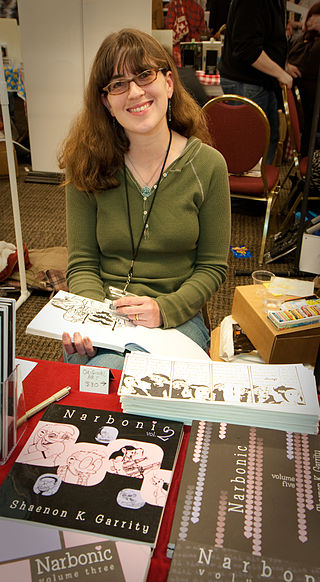Webcomics are comics published on the internet, such as on a website or a mobile app. While many webcomics are published exclusively online, others are also published in magazines, newspapers, or comic books.

Joey Manley was an American LGBT fiction author, web designer, and webcomics publisher. Manley wrote the successful LGBT novel The Death of Donna-May Dean in 1992. He moved to San Francisco in 2000 in order to work in web design. Manley was the founder and publisher of the Modern Tales family of webcomics websites, which included Modern Tales, Serializer, Girlamatic, Webcomics Nation, and others. Manley is considered one of the "founding pioneers" of the webcomic movement for creating a then-revolutionary subscription model.

Shaenon K. Garrity is an American webcomic creator and science-fiction author best known for her webcomics Narbonic and Skin Horse. She collaborated with various artists to write webcomics for the Modern Tales-family of webcomic subscription services in the early 2000s, and write columns for various comics journals. Since 2003, Garrity has done freelance editing for Viz Media on various manga translations.

Webcomics Nation was a webcomic hosting and automation service launched on July 29, 2005 by Joey Manley. Unlike Manley's previous webcomic sites, Webcomics Nation was based on user-generated content and relied on online advertisement revenue, which increased in viability in the second half of the 2000s. Webcomics Nation quickly became Manley's most financially successful website, and encouraged him to turn his Modern Tales sites partially free as well. Webcomics Nation began merging into Josh Roberts' ComicSpace in 2007, but this process took longer than hoped and Webcomics Nation eventually closed down in 2013.
Girlamatic was a webcomic subscription service launched by Joey Manley and Lea Hernandez in March 2003. It was the third online magazine Manley established as part of his Modern Tales family of websites. Girlamatic was created as a place where both female artists and readers could feel comfortable and featured a diverse mix of genres. When the site launched, the most recent webcomic pages and strips were free, and the website's archives were available by subscription. The editorial role was held by Hernandez from 2003 until 2006, when it was taken over by Arcana Jayne-creator Lisa Jonté, one of the site's original artists. In 2009, Girlamatic was relaunched as a free digital magazine, this time edited by Spades-creator Diana McQueen. The archives of the webcomics that ran on Girlamatic remained freely available until the website was discontinued in 2013.
Lea Hernandez is an American comic book and webcomic creator, known primarily for working in a manga-influenced style, and for doing lettering and touch-ups on manga imports. She is the co-creator of Killer Princesses, written by Gail Simone and published by Oni Press; and the creator of Rumble Girls from NBM Publishing.

In comics, LGBT themes are a relatively new concept, as lesbian, gay, bisexual, and transgender (LGBTQ) themes and characters were historically omitted from the content of comic books and their comic strip predecessors due to anti-gay censorship. LGBT existence was included only via innuendo, subtext and inference. However the practice of hiding LGBT characters in the early part of the twentieth century evolved into open inclusion in the late twentieth and early twenty-first centuries, and comics explored the challenges of coming-out, societal discrimination, and personal and romantic relationships between gay characters.
In American mainstream comics, LGBT themes and characters were historically omitted intentionally from the content of comic books, due to either formal censorship or the perception that comics were for children and thus LGBT themes were somehow inappropriate. With any mention of homosexuality in mainstream United States comics forbidden by the Comics Code Authority (CCA) until 1989, earlier attempts at exploring these issues in the US took the form of subtle hints or subtext regarding a character's sexual orientation. LGBT themes were tackled earlier in underground comix from the early 1970s onward. Independently published one-off comic books and series, often produced by gay creators and featuring autobiographical storylines, tackled political issues of interest to LGBT readers.
Historically, the portrayal of lesbian, gay, bisexual, and transgender (LGBT) people in media has been largely negative if not altogether absent, reflecting a general cultural intolerance of LGBT individuals; however, from the 1990s to present day, there has been an increase in the positive depictions of LGBT people, issues, and concerns within mainstream media in North America. The LGBT communities have taken an increasingly proactive stand in defining their own culture, with a primary goal of achieving an affirmative visibility in mainstream media. The positive portrayal or increased presence of the LGBT communities in media has served to increase acceptance and support for LGBT communities, establish LGBT communities as a norm, and provide information on the topic.
Although, traditionally, female comics creators have long been a minority in the industry, they have made a notable impact since the very beginning, and more and more female artists are getting recognition along with the maturing of the medium. Women creators have worked in every genre, from superheroes to romance, westerns to war, crime to horror.

Girls With Slingshots is a completed webcomic series by Danielle Corsetto that premiered on September 29, 2004. The series follows several friends as they deal with life events like unemployment, marriage, and their sexuality. Corsetto self-publishes Girls With Slingshots on her website and has released ten volumes of the collected strips through Lulu.com and TopatoCo. Corsetto has received praise for her depiction of LGBTQ characters and characters with disabilities.

Portrayals of transgender people in mass media reflect societal attitudes about transgender identity, and have varied and evolved with public perception and understanding. Media representation, culture industry, and social marginalization all hint at popular culture standards and the applicability and significance to mass culture, even though media depictions represent only a minuscule spectrum of the transgender group, which essentially conveys that those that are shown are the only interpretations and ideas society has of them. However, in 2014, the United States reached a "transgender tipping point", according to Time. At this time, the media visibility of transgender people reached a level higher than seen before. Since then, the number of transgender portrayals across TV platforms has stayed elevated. Research has found that viewing multiple transgender TV characters and stories improves viewers' attitudes toward transgender people and related policies.
The history of webcomics follows the advances of technology, art, and business of comics on the Internet. The first comics were shared through the Internet in the mid-1980s. Some early webcomics were derivatives from print comics, but when the World Wide Web became widely popular in the mid-1990s, more people started creating comics exclusively for this medium. By the year 2000, various webcomic creators were financially successful and webcomics became more artistically recognized.

Tapas, formerly known as Tapastic and originally known as Comic Panda, is a South Korean webtoon and prose publishing website and app owned by Tapas Media, a Kakao Entertainment company. It was created in 2012 by entrepreneurs Young-Jun Jang and Chang Kim, who is currently Tapas Media's CEO.

Webtoon is an American-South Korean webtoon platform launched in 2004 by Naver Corporation, providing hosting for webtoons and compact digital comics. The platform, controlled by Naver and the Naver-SoftBank Group joint venture LY Corporation through a Delaware-domiciled, Los Angeles, California-headquartered holding company Webtoon Entertainment Inc., is free and can be found both on the web at Webtoons.com and on mobile devices available for both Android and iOS.
Assigned Male is a webcomic illustrated and written by Sophie Labelle. It draws upon her experiences as a trans girl and woman. The comic, and series of zines, address issues of gender norms and privilege. It began in October 2014 and is ongoing, published in English and French. The webcomic is released in printed anthologies on Labelle's online store.
Notable events of 2015 in webcomics.
Aarthi Parthasarathy is an Indian filmmaker and webcomic creator. Having grown up in Mumbai and living in Bengaluru, Parthasarathy is known for creating the webcomic Royal Existentials and writing for the webcomic Urbanlore. Parthasarathy became part of feminist art collective Kadak in March 2016, where she has collaborated to create Personal (Cyber) Space and Aloe Vera and The Void.

Let's Play is a romantic comedy comic series by Leeanne M. Krecic, also known as Mongie, which is published by Rocketship Entertainment. Let's Play was published digitally on Webtoon from 2016 to 2022. It follows the romantic and professional life of Sam Young, who is discovering romance as she works on her video game development career.











